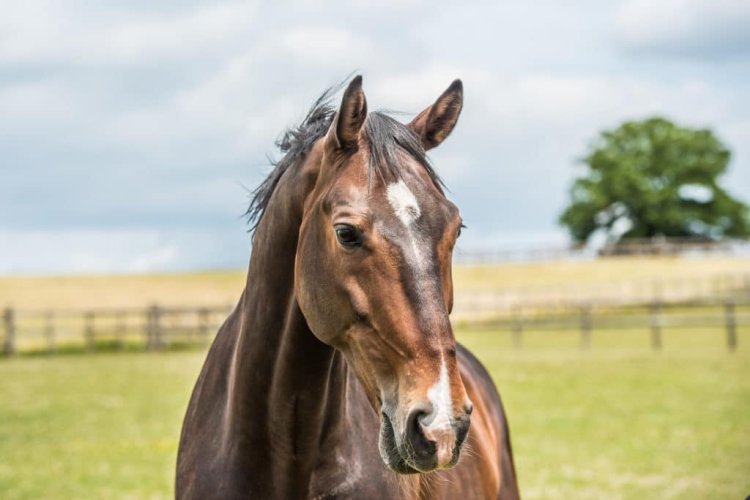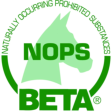in basket
The gut-brain connection in horses

Introduction
I have talked many times about the importance of a healthy gut and in my previous article on behaviour I briefly mentioned the link between the populations in the gut and the horse’s brain. It is well known that a two-way communication system exists between the gut and the brain, which is referred to as the gut-brain axis. There is also increasing evidence that gut microbiota can impact on behaviour, known as the microbiome-gut-brain axis. In this article, I take a more detailed look at the gut-brain axis.
The microbiome-gut-brain axis in horses
There has been a wealth of studies across a number of species that have identified a strong link between gut microbiota and an individual’s health and wellbeing, and from that there has been a significant interest on the relationship between the gut and the brain. This communication system has several routes (or pathways), some of which involve direct communication via the nervous system and others that involve indirect communication through the neuroendocrine and immune systems. All of these pathways by which the gut and brain communicate are thought to work together. There is also a great deal of evidence that the microbial populations that live in the gut play a key role in influencing the gut-brain communications, which has led to the concept of the microbiome-gut-brain axis. The influence of the microbes in the gut is thought to impact on the central nervous system and hence influence behaviour.
Whilst it is not yet fully understood how microbiota in the gut impact on behaviour, it is thought that one of the pathways is via the vagus nerves. The vagus nerve is a major nerve of the nervous system that provides a direct communication link between the gut and the brain. However, it is thought that the communication extends to other pathways as well; for example, research has shown an association between behaviour and immune response. In addition, gut inflammation due to a parasite burden has also resulted in anxiety-type behaviour that was reversed with treatment.
Studies have also shown associations between gut microbes and early behavioural development; for example, animals with an established gut microbiome showed a lower response to stress compared to those with no establishment of a gut microbiome. It is not entirely clear why this occurs, but one possible explanation is through hormones produced by the gut microbes. In fact, the gastrointestinal tract produces more than 20 hormones that communicate with the brain as well as stimulating and supressing the release of other hormones. There are several hormones produced by gut microbes that act as neurotransmitters (chemical messengers), including serotonin and dopamine. These neurotransmitters are involved in several physiological functions, including locomotion, gut motility (movement), as well as having a significant role in the behavioural responses of an individual.
Research has shown that the levels of neurotransmitters can be moderated by gut microbiota, with certain bacteria shown to increase the levels of the amino-acid tryptophan, which is involved in the synthesis of serotonin. In fact, the addition of certain bacteria into the gut have been shown to be more effective in the treatment of depression and anxiety than pharmaceutical drugs.
Equine diet, behaviour and microbes
It is well documented that diet has a significant impact on the composition of the microbes in the gut both in horses and other species, including humans. It has been seen in other species that undigested starch entering the large intestine is associated with increased anxiety and aggression. It was initially thought that this was due to digestive discomfort; however, further studies highlighted that the composition of gut microbiota had an influence on behaviour and that the effect the starch had on behaviour was as a result of changes in microbiota, rather than fully attributed to digestive discomfort. In horses, there has been anecdotal evidence that diets high in starch can lead to behavioural changes, with horses reported to be “spooky” and “on their toes”.
As discussed previously, horses have evolved to eat a diet high in fibre on an almost continuous basis. As such, horses have a limited ability to digest starch in the small intestine and any undigested starch passes to the large intestine where it is fermented by the resident microbial population. Thus, contrary to previous thoughts around these higher starch diets providing extra energy that resulted in less desirable behaviour, current thinking is around the impact the undigested starch has on the hindgut microbes, which then impacts on behaviour. I’m sure many of us will have owned or known of a horse that is a bit “lazy” and lacking in forwardness and will no doubt have tried to add additional energy to the diet to address this. What you have likely found is that your horse is no more forward going but is much more likely to spook.
As I’ve also discussed previously, research at the University of Glasgow’s School of Veterinary Medicine has shown that horses fed diets containing starch, such as concentrate feeds containing cereals grains (oats, barley, maize), are likely to be more reactive than those horses fed a fibre-only diet. When horses are fed the same amount of energy but in different forms, starch versus fibre, their heart rates and reactiveness are greater when fed starch compared to fibre-only. Horses fed starch were less predictable in their behaviour compared to those fed a complete fibre diet and were therefore more difficult to handle. The horses on the fibre-only diet were also more settled and less reactive compared to those fed starch. The group of horses fed the starch feed were also observed to be more tense, nervous and unsure about their surroundings. It is important to note that the amount of starch that was fed was less than many leisure horses receive in their ration, which shows that even small amounts of starch in the diet can have a significant effect on your horse’s behaviour.
Other studies have seen similar effects of diets containing starch, where horses were reported to be more excitable, nervous and reactive when fed diets containing starch compared to a forage-only ration. In humans, specific bacteria (Firmicutes) can impact on the synthesis of serotonin by reducing tryptophan availability. Whilst this is limited in humans because of the number of those bacteria present, Firmicutes is one of the dominant bacteria in the horse’s hindgut and therefore it is possible that certain types of the bacteria may interfere with neurotransmitter biosynthesis under certain conditions, such as dietary changes. Certain bacteria in the gut are essential for serotonin production by converting tryptophan into this neurotransmitter. Therefore, alternations in bacterial populations may lead to a reduction in serotonin production, which has been seen in other species.
Studies have also shown that the increased amounts of lactic acid produced in the hindgut when starch enters may also alter the biosynthesis of the neurotransmitter’s dopamine and serotonin. The majority of serotonin is found in the gut where it is produced by specific cells present, and gut microbes play a role in regulating the production of serotonin by these cells. Serotonin is also present in the brain, where it is synthesised from tryptophan and it is thought that microbes may influence the amount of circulating tryptophan available for conversion to serotonin in the brain as a result of its metabolism in the gut.
Dopamine can also be affected by alterations in gut microbes. Although it is mainly synthesised in the brain, dopamine is also is involved in gut regulation and is a precursor to adrenaline. Stress can impact on dopamine pathways in the brain. Stress can take many forms and some stress responses are required for an animal to make behavioural and biochemical responses to enable them to survive. Prey species, such as the horse, rely on being able to respond to a threat in the wild and this will result in a fight or flight response to a stressful and threatening situation. Dopamine and adrenaline play an important role in the flight response by controlling various body processes in response to stress, which is known as the hypothalamic-pituitary-adrenal (HPA) axis.
The HPA axis is a major physiological stress system (also referred to as the stress-axis) that produces cortisol. It is also thought that diet may have a direct influence on dopamine systems; diets that are sweet in taste have been seen to elevate dopamine levels in the brain and it is thought that this may be a mechanism to help animals seek out and recognise food sources in the wild that are more nutrient dense. Increased dopamine activity in the brain has also been associated with behavioural reactivity.
Therefore, any impact of diet on dopamine or serotonin levels both in the gut and the brain can have a substantial impact on behaviour, and whilst the exact mechanism for this is not yet fully understood, there is evidence indicating that changes in gut microbiota can result in an increased stress response in horses. Consequently, what you feed your horse impacts health, performance and behaviour, and therefore it’s important to feed a diet high in fibre and to make any dietary changes very gradually.
Article written for Premier Performance by Professor Jo-Anne Murray.






